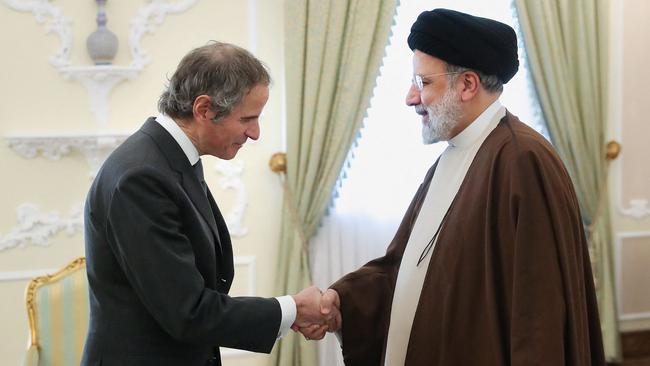Iran vows to increase co-operation with IAEA over nuclear work
UN atomic agency chief says Iran promised to reinstall monitoring equipment, but other issues left unresolved.

Iran made fresh promises to increase its co-operation with the UN atomic agency on Saturday, but International Atomic Energy Agency chief Rafael Grossi returned from Tehran with no breakthrough over a series of Western concerns about Iran’s nuclear activities.
In a press conference on his return, Mr Grossi said Iran had promised to allow the agency to reinstall cameras and other monitoring equipment at several important nuclear-related facilities. Iran removed the equipment last summer.
The two sides agreed to a joint statement that also committed Tehran to improved co-operation over a multi-year probe into undeclared nuclear material found in Iran. Iran has stonewalled that investigation for years, according to the IAEA.
Last year, Iran removed IAEA cameras and enrichment monitors from a number of sites linked to Iran’s nuclear program. They included facilities that produce yellowcake — material that can be turned into nuclear fuel — and locations that produce the key parts of centrifuges, machines that enrich uranium.
The IAEA equipment was placed there under the terms of the 2015 nuclear deal to ensure Iran wasn’t running a covert program to produce nuclear fuel.
The removal of the cameras last summer meant that the agency was no longer able to confirm Iran’s nuclear program was purely peaceful. Restoring the cameras will still leave a nine-month gap in the agency’s knowledge of how many centrifuges and how much yellowcake Iran has produced. But the IAEA has said it hopes to be able to piece together a reasonably clear picture of Iran’s work.
Mr Grossi said work on reinstalling the cameras and monitoring equipment should start in the next few days. However, the joint statement made no such specific pledges. It only said Iran will “on a voluntary basis” permit the IAEA to improve its monitoring of Iran’s activities and that the two sides would meet soon to discuss the details.
In Iran, Mr Grossi met with high-level officials including President Ebrahim Raisi, Iran’s foreign minister and the head of the Iranian atomic agency.
The IAEA director general said his counterparts had promised to give the agency access to people and places it wants to visit to answer questions about the undeclared nuclear material found in Iran. However, Tehran has made a series of commitments to do so in the past that it has not followed through on.
The IAEA’s probe into undeclared nuclear material in Iran proved to be a key stumbling block last summer to reviving the 2015 nuclear deal. That agreement lifted most international sanctions on Tehran in exchange for tight but temporary restrictions on its nuclear work.
Iran insisted that the probe be ended before the nuclear agreement could be restored, a promise that the US and its European partners said depended entirely on Tehran answering the IAEA’s questions.
Since then talks on reviving the nuclear deal have essentially frozen following Iran’s crackdown on protesters at home and its military support for Russia in Ukraine.
Mr Grossi returned from Iran with no significant new information about the agency’s discovery of near weapons-grade particles found at Iran’s underground Fordow facility. The discovery deepened concerns about Iran’s nuclear plans.
Iran says its nuclear program is purely peaceful despite ample evidence that Iran worked on a nuclear weapons program in the past.
Iran claimed the production of the 84 per cent enriched material was accidental, but senior diplomats monitoring Iran’s activities have said it could have been the result of experiments aimed at paving the way to produce weapons-grade enriched uranium.
Iran is already producing 60 per cent highly enriched uranium, the only non-nuclear weapons state to do so.
If Iran deliberately starts producing weapons-grade material, it could lead to crisis over the country’s nuclear activities. European diplomats have said that would be the trigger for them to move to formally kill a 2015 nuclear deal. Western officials also say it could prod Israel to pursue a military attack on Iran’s nuclear program. Israeli officials haven’t been public about their plan.
The IAEA board of member states meets this week and will discuss Iran’s nuclear program. Last week, the US and European countries were split over whether to censure Iran over its recent nuclear activities, including the production of near-weapons-grade material.
The Biden administration was reluctant to pass a resolution rebuking Iran for its recent nuclear work. Tehran has in the past reduced its co-operation with the IAEA or stepped up its nuclear work after being rebuked by the agency’s board.
The Wall Street Journal



To join the conversation, please log in. Don't have an account? Register
Join the conversation, you are commenting as Logout